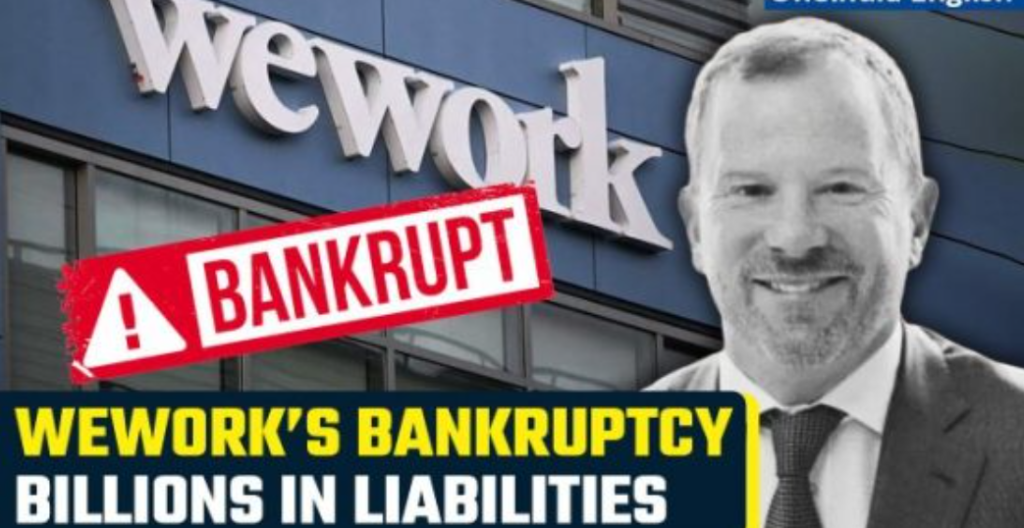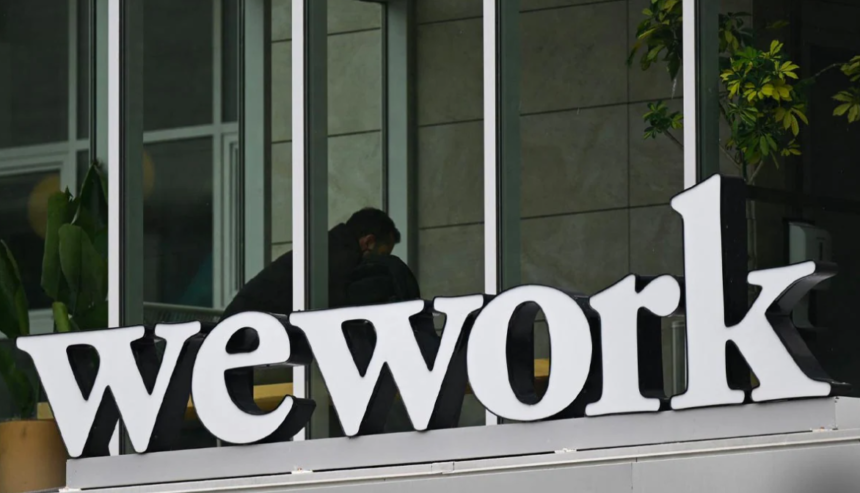WeWork listed estimated assets and liabilities in the $10 billion to $50 billion range in a bankruptcy petition with the New Jersey bankruptcy court.
WeWork, the SoftBank Group-backed firm whose stratospheric rise and fall revolutionized the global office industry, filed for Chapter 11 bankruptcy protection in the United States on Monday, after its bets on businesses using more of its office-sharing space soured. SoftBank, the Japanese technology conglomerate that owns around 60% of WeWork and has invested billions of dollars in its turnaround, has admitted that the company cannot survive unless it renegotiates its exorbitant leases in bankruptcy.

It stated that it has gone into a restructuring deal with key stakeholders in order to dramatically decrease its existing funded debt, and that it also intends to initiate recognition proceedings in Canada. These procedures have no bearing on the company’s locations outside of the United States and Canada, as well as its franchisees around the world, it added. WeWork’s stock has dropped over 98.5% this year.
Profitability has been elusive as It struggles with costly leases and corporate clients canceling due to some employees working from home. In the second quarter of 2023, paying for space accounted for 74% of WeWork’s revenue.

It listed estimated assets and liabilities in the $10 billion to $50 billion range in a bankruptcy petition with the New Jersey bankruptcy court. “WeWork could use provisions of the U.S. bankruptcy code to rid itself of onerous leases,” law firm Cadwalader, Wickersham & Taft LLP warned in an August notice to landlords on its website. Some landlords anticipate a substantial impact.
“As part of today’s filing, It is requesting the ability to reject the leases of certain locations, which are largely nonoperational, and all affected members have received advanced notice,” the firm said in a statement. WeWork, founded by Adam Neumann, developed to become the most valuable startup in the United States, valued at $47 billion. It received financing from blue-chip investors such as SoftBank and venture capital company Benchmark, as well as support from big Wall Street banks such as JPMorgan Chase.

Neumann’s drive of fast growth at the expense of revenues, as well as allegations about his eccentric conduct, led to his dismissal and the cancellation of an IPO in 2019. SoftBank was obliged to increase its stake in WeWork and hire real estate veteran Sandeep Mathrani as CEO. SoftBank agreed to take WeWork public in 2021 through a merger with a blank-check acquisition business for a $8 billion valuation.
It was able to modify 590 leases, saving around $12.7 billion in fixed lease payments. However, this was insufficient to compensate for the COVID-19 pandemic, which kept office workers at home. Many of its landlords, who were also under pressure, had little reason to give WeWork a break on lease conditions. While WeWork had some success in attracting giant conglomerates as clients, the majority of its customers were startups and small enterprises who cut back on spending as inflation rose and economic prospects deteriorated.

WeWork’s troubles were exacerbated by competition from its own landlords. To deal with the slump in the office sector, commercial property companies who had previously only entered into long-term leasing agreements began providing short and flexible leases. Mathrani was succeeded as it’s CEO this year by David Tolley, a former investment banker and private equity executive who, as CEO of Intelsat, helped the debt-ridden satellite communications operator escape from bankruptcy in 2022.
WeWork engaged in financial restructurings, however this was insufficient to keep the company from going bankrupt. Last week, the company obtained a seven-day extension from its creditors on an interest payment in order to have more time to negotiate with them. Neumann stated in a statement shortly before WeWork filed for bankruptcy, “I believe that, with the right strategy and team, a reorganization will enable it to emerge successfully.”
Frequently asked questions
Did WeWork file for bankruptcy?
WeWork, the ailing coworking space provider, has declared bankruptcy, bringing to an end what was once the world’s most valuable startup. The Chapter 11 bankruptcy filing was widely anticipated after the company announced last month that it was struggling to repay its debts.
Who purchased WeWork?
In March 2021, the company agreed to merge with BowX Acquisition Corp. and become a public corporation through a special-purpose acquisition company with a $9 billion valuation.
What was the reason for the failure of WeWork?
Oversaturated marketplaces, vacant locations, and limited resources It failed to grasp that success in one place would not guarantee success in all locations; a one-size-fits-all approach was fundamentally faulty in an industry where location is critical.
Who is CEO of WeWork now?
David Tolley
Who is the CEO of WeWork India?
Karan Virwani
Click here, to check out the latest post on Instagram.
Also Read: Nykaa Stock Q2 Results: Revenue Rises 22% As Net Profit Soars 50% To ₹7.8 Crore
image source: google




































